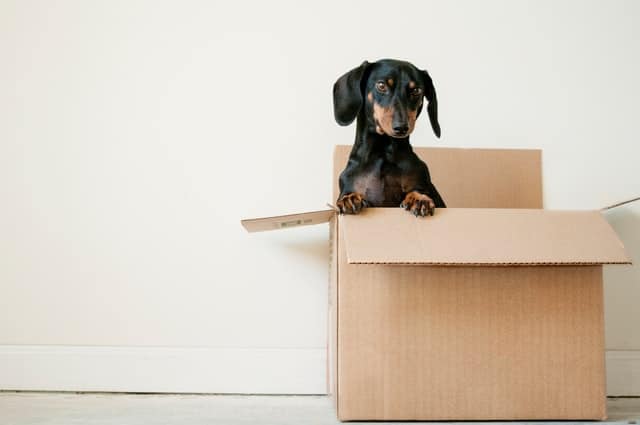Sleep is not only an important part of life for humans.
Puppies sleep between 20 and 22 hours a day.
In order for your little puppy to grow up to be a healthy and happy dog, he needs rest periods in which he can recharge his batteries. As an owner, you can support him in this with a few simple methods.
In this article, we will show you how to deal with your puppy’s need for sleep.
How many hours of sleep does a puppy need per day?
A dog’s sleep needs depend on many factors. These include his age or his state of health.
While adult dogs sleep an average of 15 to 20 hours a day, puppies need as much as 20 to 22 hours of sleep a day. It is normal for puppies to sleep up to 90 percent of the day.
However, dogs do not always sink into deep sleep.
Your dog’s sleep stages include:
- Deep sleep
- light dozing
- Relaxation
These phases are important because your puppy still needs a lot of rest from all the impressions you experience with him.

While the dog can also dream during deep sleep, his nose and ears are still active during dozing. However, all sleep phases are important for the dog’s health.
Why does a puppy need so much sleep?
Sufficient sleep and rest are equally important for puppies and adult dogs. During its rest phases, the dog refuels energy and processes the experiences of the day. Puppies in particular need many hours of sleep.
Sleep serves to strengthen the muscles, the development of the brain and the central nervous system, as well as the immune system.
At the same time, the puppy processes the numerous impressions of its journeys of discovery through the world during sleep. Only a rested puppy can process and internalise the new impressions.
Ideally, you will have taught your puppy new commands or shown him new impressions before he goes to sleep. These are then processed by your puppy during sleep.
Since sleep is important for your puppy, it is equally unfavourable to prevent him from sleeping.
How does lack of sleep affect the puppy?
Lack of sleep is permanently detrimental to your dog’s happiness and health.
Signs of sleep deprivation can include a sluggish gait and irritable behaviour. Without enough sleep, the dog will release a lot of stress hormones, which will cause a permanently elevated stress level.
Tired dogs are more nervous and also less concentrated. They cannot process their new impressions, so they are not capable of learning. They do not react to what they have already learned in the way you know them.
In this case, it would be unfair to your puppy to punish it for not being able to perform something the way it should because you ignored your puppy’s need for sleep.
In the long run, lack of sleep can weaken your puppy’s immune system and make him more susceptible to illness. This cannot be replaced by optimal nutrition.
So it’s important to fill the days with structure, allowing your puppy to experience active and passive times.
Can I help the puppy sleep?
The dog often adapts its behaviour to humans and puts its own need for rest on the back burner. Puppies in particular quickly get caught up in a cycle of successive activities.
The puppy quickly becomes over-excited and forgets its own need for rest due to the overstimulation. Puppies must first learn to recognise their tiredness and come to rest.

As an owner, you can support your puppy in this process if you pay attention to the following points:
- Rest as little as possible when there is little hustle and bustle.
- Offer his favourite toy at his place of rest
- Check the sleeping place for the puppy
The behaviour of the owner is crucial in helping the puppy to settle down. If your puppy retreats for a nap, you should acknowledge him and not disturb him unnecessarily. As many puppies seek closeness to their owner, you can lie down with them to help them settle down more quickly.
Chewing on chew toys also demands energy and calms many puppies. It is especially important that you remain patient and radiate calm. A regular daily routine can also help your puppy to get used to quiet times.
However, a suitable place to sleep is especially important.
You can choose a basket, a dog crate or another suitable alternative. It is important that the puppy feels safe and secure there. The location of the basket is also important. It should not be isolated so that the puppy can still feel close to people. Nevertheless, the basket should be in a quiet place that is not a walking path for you.
This will prevent the dog from startling you. A draughty place or a place near the heating is also not suitable for a sleeping place. Quiet corners of your home are more suitable.
Once you have got your puppy used to a fixed sleeping place, you should not change it. Even an active puppy can quickly settle down in a comfortable basket with familiar scents.
The puppy does not settle down
If all these tips still don’t help, a look from your puppy’s point of view can help you find the reasons for the lack of sleep.
Possible reasons for your puppy’s restlessness can include many causes:
- Excessive demands
- New environment
- Smells
- Unfamiliar voices
- Food change
These are some possible sources of energy that can be stressful for your puppy.
Nevertheless, a gentle introduction to all everyday situations is indispensable. Especially between the 12th and 16th week of life, the puppy will absorb many new impressions much faster. During this time it is important to confront him with many situations.
Of course, your puppy should neither be over- nor underchallenged during this time. The middle ground is crucial.
Here we have summarized our most popular posts for you in a great overview:
- Which dogs like to cuddle?
- Which dog is suitable for allergy sufferers?
- How much does a dog cost per month?
- What to look for in a German Shepherd Dog
- Do dogs know when you are angry with them?
- Are Dachshunds family dogs
- Small or large dog
- Puppy can’t settle down
- How often does a Maltese need a haircut?
- Optimal daily routine for puppies
Conclusion: Is there too much sleep for a puppy?
It is perfectly normal for puppies to need 20 to 22 hours of sleep a day. Young and active puppies in particular sleep through large parts of the day and night.
A good night’s sleep and sufficient rest during the day are important for your puppy’s health. This is the only way he can recharge his batteries and process the events of the day. To ensure that your puppy sleeps sufficiently, you should let him rest after active phases and positively encourage his naps.
Your puppy processes the impressions of the day during sleep, which is why it is also important for bundles of energy to get a good night’s sleep.
You can contribute to this by teaching your puppy that the day with you is divided into many rest and event times.



